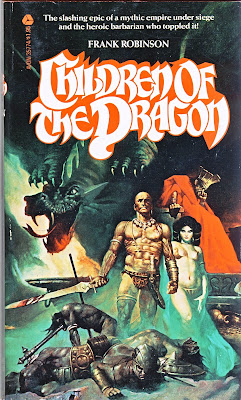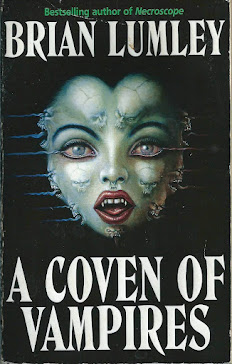Book Review: 'Children of the Dragon' by Frank S. Robinson
4 / 5 Stars
Not to be confused with Frank M. Robinson (‘The Glass Inferno’, ‘Waiting’, ‘The Prometheus Crisis’), Frank S. Robinson apparently published only one novel in his time, this 1978 Avon paperback. The great cover illustration is, unfortunately, uncredited.
‘Children’ gives away most of its plot on the back cover, so I’m not disclosing any spoilers when I provide this brief outline:
Long ago, on an alternate earth, in the empire of Bergharra, rules the emperor Sarbat Satanichadh.
Sarbat is a psychopath, fond of meting out the most hideous punishments for no other reason than because he can. When a notorious bandit named Jehan Henghmani is captured and imprisoned in the fetid dungeons beneath the emperor’s palace, Sarbat decides to take a look at this monster. For Jehan is indeed a monster: seven feet tall, surpassingly strong, and surpassingly ugly.
When Jehan mocks the emperor as the ruler peers through the cell bars at him, Sarbat does not fly into a rage and order the bandit executed; instead, in a fit of perverse whimsy, he orders Jehan spared. Only to be continuously tortuted – but never to death – for the rest of his natural life.
And to add to the torments to be inflicted on Jehan Henghmani, the prisoner is to be fed exclusively on human flesh – the legend of Jehan the ‘Man-Eater’ is to be made literal.
The first 100 pages of ‘Children’ detail, in prose not for the squeamish, the agonies inflicted on our hapless bandit hero. Even hard-core splatterpunk readers may be turned off by the atrocities detailed in the prison segment of the book. Things get a little more 'gentle' in the remaining pages, but not by much. Author Robinson takes a proto-Splatterpunk approach to things that was more than a little transgressive for a mainstream work of fiction produced in the late 70s.
Of course, Jehan ultimately escapes his prison, and the remainder of the book deals with his rise to power and his pursuit of revenge.
‘Children’ has the strengths and weaknesses of its genre, the 70s ‘epic’ adventure that served as the primary (and financially successful) creative output for authors such as James Clavell, John Jakes, and James Michener. The world of Bergharra and its peoples is drawn with depth and detail; the plot expands in time and space as the narrative unfolds; and each chapter brings new twist and turns to the overall storyline.
However, the middle sections of the novel tend to drag, and the reader may find himself or herself having to persevere in order to arrive at the final chapters.
‘Children’ has a downbeat, cynical tenor that reflects its late 70s conception, and this may make it worthwhile to readers who are looking for an epic ‘barbarian’ fantasy with a flavor different from contemporary novels and series like ‘The Name of the Wind’, ‘The Game of Thrones’, and 'The Warded Man’.

























